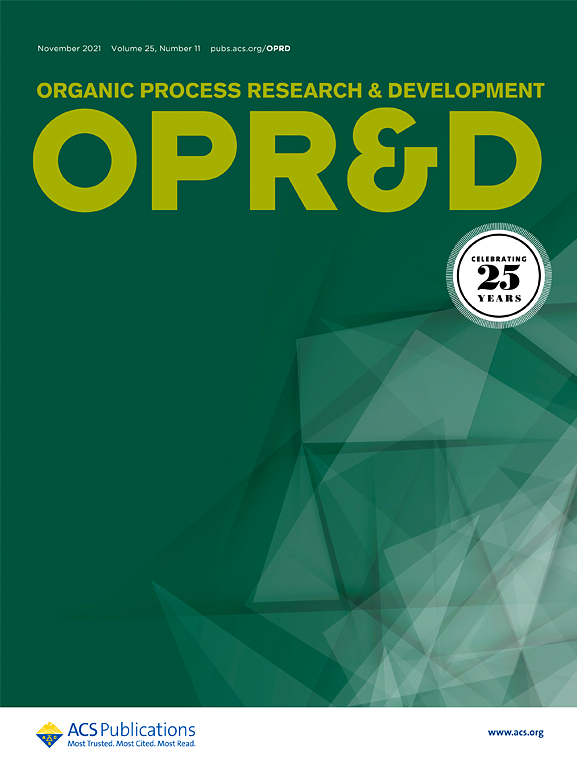Lessons Learned in Organic Process Chemistry
IF 3.5
3区 化学
Q2 CHEMISTRY, APPLIED
引用次数: 0
Abstract
Published as part of Organic Process Research & Development special issue “Lessons Learned in Organic Process Chemistry”. The saying “failure is the mother of success” is familiar across cultures, and nowhere is it more relevant than in the practice of process chemistry. Behind every successful scale-up or robust manufacturing route lies a history of experiments that did not work as planned. These moments, though often left unspoken, are not wasted efforts. They are the foundation on which durable processes we develop and commercialize are built. In our field, progress rarely follows a straight line. The pursuit of an optimal process for a novel pharmaceutical or agrochemical entity requires navigating unexpected outcomes, revisiting assumptions, and adapting strategies. Impurities emerge without warning, crystallization pathways never meet our expectations, and reaction conditions that seem ideal on paper or even small scale can unravel at scale. Each challenge becomes a source of learning─insight that shapes the next experiment, the next campaign, and ultimately, the success of a program. What distinguishes process chemistry is not only the ingenuity of its technical solutions but also the willingness of its experts in the field to learn from the difficulties they have encountered and share those learnings. Communication is our most powerful tool. By recording and exchanging the lessons of setbacks as well as successes, we accelerate discovery, avoid repeating costly detours, and collectively raise the standard of our discipline. Traditionally, the academic record has emphasized positive results and final outcomes, while the equally important “negative data” have remained within individual laboratories or organizations. This Special Issue of Organic Process Research & Development takes a different approach. It shines a light on the knowledge gained from failures, unexpected results, and the insights that arise from them. By curating these experiences, we aim to transform private lessons into a positive experience so that then shared wisdom can benefit the broader community. We hope that the case studies presented in this Special Issue will serve as both guideposts and encouragement. For the next generation of process chemists, they demonstrate that setbacks are not end points but turning points. For experienced practitioners, they provide a reminder that our discipline advances most when we are candid about the full journey of development, not just its successes. May these contributions inspire all of us to continue learning, recording, and sharing the lessons that shape the art and science of process chemistry. This article has not yet been cited by other publications.有机过程化学的经验教训
作为有机过程研究与发展特刊“有机过程化学的经验教训”的一部分发表。“失败是成功之母”这句话在各种文化中都很常见,而在过程化学的实践中,这句话的意义最为明显。在每一个成功的规模扩张或稳健的生产路线背后,都有一个没有按计划进行的实验历史。这些时刻,虽然经常被忽视,但并不是徒劳的努力。它们是我们开发和商业化持久工艺的基础。在我们的领域,进步很少是直线的。为一种新的药物或农化实体追求最佳过程需要导航意想不到的结果,重新审视假设,并适应策略。杂质毫无征兆地出现,结晶途径永远不会达到我们的期望,在纸上甚至小尺度上看起来理想的反应条件可能会在大规模上瓦解。每一次挑战都成为学习的源泉──洞察力会影响下一个实验、下一个活动,并最终影响一个项目的成功。过程化学的独特之处不仅在于其技术解决方案的独创性,还在于该领域的专家愿意从遇到的困难中学习并分享这些经验。沟通是我们最强大的工具。通过记录和交流失败和成功的经验教训,我们加快了发现,避免重复昂贵的弯路,并共同提高了我们学科的标准。传统上,学术记录强调的是积极的结果和最终结果,而同样重要的“消极数据”则留在个别实验室或组织内部。本期《有机工艺研究与开发》特刊采用了不同的方法。它照亮了从失败中获得的知识,意想不到的结果,以及由此产生的见解。通过整理这些经验,我们的目标是将私人课程转化为积极的经验,这样分享的智慧就可以使更广泛的社区受益。我们希望本期特刊所介绍的个案研究,能起到指引和鼓励的作用。对于下一代过程化学家来说,他们证明了挫折不是终点,而是转折点。对于经验丰富的实践者来说,他们提醒我们,当我们对整个发展过程坦诚相待时,我们的学科进步最大,而不仅仅是它的成功。愿这些贡献激励我们所有人继续学习、记录和分享塑造过程化学艺术和科学的经验教训。这篇文章尚未被其他出版物引用。
本文章由计算机程序翻译,如有差异,请以英文原文为准。
求助全文
约1分钟内获得全文
求助全文
来源期刊
CiteScore
6.90
自引率
14.70%
发文量
251
审稿时长
2 months
期刊介绍:
The journal Organic Process Research & Development serves as a communication tool between industrial chemists and chemists working in universities and research institutes. As such, it reports original work from the broad field of industrial process chemistry but also presents academic results that are relevant, or potentially relevant, to industrial applications. Process chemistry is the science that enables the safe, environmentally benign and ultimately economical manufacturing of organic compounds that are required in larger amounts to help address the needs of society. Consequently, the Journal encompasses every aspect of organic chemistry, including all aspects of catalysis, synthetic methodology development and synthetic strategy exploration, but also includes aspects from analytical and solid-state chemistry and chemical engineering, such as work-up tools,process safety, or flow-chemistry. The goal of development and optimization of chemical reactions and processes is their transfer to a larger scale; original work describing such studies and the actual implementation on scale is highly relevant to the journal. However, studies on new developments from either industry, research institutes or academia that have not yet been demonstrated on scale, but where an industrial utility can be expected and where the study has addressed important prerequisites for a scale-up and has given confidence into the reliability and practicality of the chemistry, also serve the mission of OPR&D as a communication tool between the different contributors to the field.

 求助内容:
求助内容: 应助结果提醒方式:
应助结果提醒方式:


